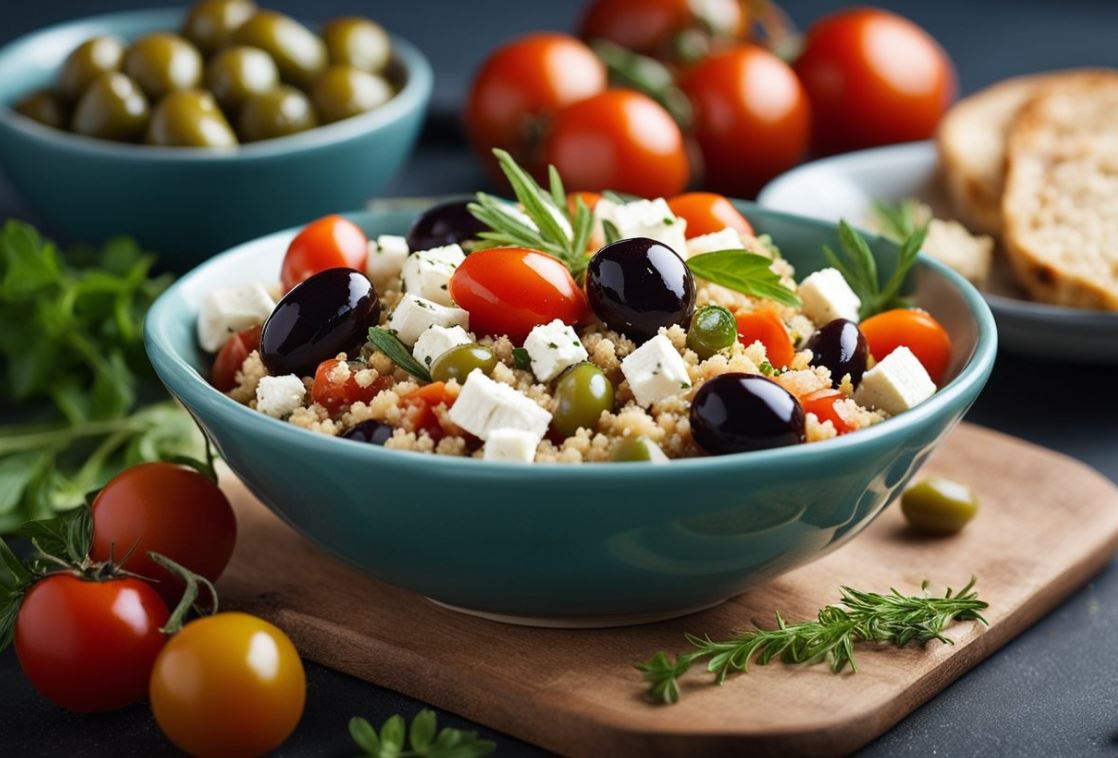The Best Fluffy Pancakes recipe you will fall in love with. Full of tips and tricks to help you make the best pancakes.

High-Protein Healthy Mediterranean Diet Dinner Recipes
The Mediterranean diet is a popular and healthy eating plan that is inspired by the traditional dietary patterns of countries that surround the Mediterranean Sea. It is a balanced and nutritious diet that emphasizes on consuming plant-based foods, healthy fats, and lean proteins.
Key Components
The Mediterranean diet is characterized by the following key components:
- Plant-based foods: The Mediterranean diet emphasizes on consuming plenty of fruits, vegetables, whole grains, legumes, nuts, and seeds. These foods are rich in vitamins, minerals, fiber, and antioxidants that are essential for good health.
- Healthy fats: The Mediterranean diet is rich in healthy fats such as olive oil, nuts, and fatty fish like salmon. These fats are beneficial for heart health and help in reducing inflammation.
- Lean proteins: The Mediterranean diet emphasizes on consuming lean proteins like poultry, fish, and plant-based sources like legumes and nuts. These proteins are essential for muscle growth and repair.
Health Benefits
The Mediterranean diet has been associated with several health benefits, including:
- Reduced risk of heart disease: The Mediterranean diet is rich in healthy fats and antioxidants that help in reducing inflammation and improving heart health.
- Improved brain function: The Mediterranean diet is rich in omega-3 fatty acids that are essential for brain health and may help in reducing the risk of cognitive decline.
- Lower risk of cancer: The Mediterranean diet is rich in plant-based foods that are high in antioxidants and may help in reducing the risk of certain types of cancer.
Incorporating the Mediterranean diet into your daily routine can be a delicious and healthy way to improve your overall health and wellbeing.
The Role of Protein in the Mediterranean Diet

Importance of Protein
Protein is an essential nutrient that plays a crucial role in maintaining good health. It is a macronutrient that is required for the growth and repair of tissues, the production of enzymes and hormones, and the proper functioning of the immune system. The Mediterranean diet is a healthy eating plan that emphasizes the consumption of whole foods, including protein-rich sources such as fish, poultry, legumes, and nuts.
Including adequate amounts of protein in your diet is important for maintaining muscle mass and preventing muscle loss, especially as you age. Protein also helps to keep you feeling full and satisfied, which can aid in weight management and prevent overeating.
Protein Sources
The Mediterranean diet is rich in protein sources that are both delicious and nutritious. Some of the best protein sources in this diet include:
- Fish: Fish is a staple in the Mediterranean diet and is a great source of protein, omega-3 fatty acids, and other important nutrients. Some of the best fish choices include salmon, tuna, sardines, and mackerel.
- Poultry: Chicken and turkey are lean sources of protein that can be easily incorporated into Mediterranean-style meals. Opt for skinless, boneless cuts to keep the fat content low.
- Legumes: Legumes such as lentils, chickpeas, and beans are high in protein, fiber, and other important nutrients. They are also versatile and can be used in a variety of Mediterranean-inspired dishes.
- Nuts and seeds: Nuts and seeds are a great source of plant-based protein, healthy fats, and other important nutrients. Almonds, walnuts, pistachios, and chia seeds are all great choices.
Incorporating these protein-rich foods into your Mediterranean-style meals can help you meet your daily protein needs while also enjoying delicious, healthy foods.
Planning Your High-Protein Mediterranean Dinner

When it comes to planning a high-protein Mediterranean dinner, there are a few things to keep in mind to ensure that you are getting all the nutrients your body needs. Here are some meal planning tips and shopping list essentials to help you get started.
Meal Planning Tips
To plan a healthy and balanced Mediterranean dinner, you should aim to include a variety of nutrient-dense foods. Start by choosing a protein source such as fish, chicken, or legumes. Then, add in plenty of colorful vegetables and whole grains to round out your meal.
When planning your meals, it’s also important to consider your portion sizes. While protein is an important part of a healthy diet, it’s easy to overdo it. A good rule of thumb is to aim for a serving size of 3-4 ounces of protein per meal.
Another tip is to include healthy fats in your meals, such as olive oil, nuts, and seeds. These can help keep you feeling full and satisfied, and they also provide important nutrients for your body.
Shopping List Essentials
To make sure you have everything you need for your high-protein Mediterranean dinner, here are some essential items to add to your shopping list:
- Protein: salmon, chicken breast, lentils, chickpeas
- Vegetables: spinach, kale, bell peppers, tomatoes, zucchini
- Whole grains: quinoa, brown rice, whole wheat pasta
- Healthy fats: olive oil, avocado, almonds, walnuts
In addition to these items, you may also want to stock up on herbs and spices to add flavor to your meals, such as garlic, oregano, and basil.
By following these meal planning tips and stocking up on essential ingredients, you can create delicious and nutritious high-protein Mediterranean dinners that your whole family will love.
Recipe Selection

When it comes to selecting high-protein healthy Mediterranean diet dinner recipes, there are plenty of options to choose from. Whether you prefer fish and seafood, poultry, legumes, or tofu and tempeh, there are delicious and nutritious recipes that will satisfy your taste buds and keep you feeling full and energized.
Fish and Seafood Recipes
Fish and seafood are excellent sources of protein and omega-3 fatty acids, which are essential for maintaining good health. Some great Mediterranean-inspired fish and seafood recipes include grilled salmon with lemon and herbs, baked cod with tomatoes and olives, and shrimp and vegetable skewers with a garlic and herb marinade.
Poultry-Based Recipes
Chicken and turkey are lean sources of protein that can be incorporated into a variety of Mediterranean-style dishes. Some tasty and healthy options include grilled chicken with a Greek yogurt and cucumber sauce, baked turkey meatballs with a tomato and basil sauce, and chicken and vegetable stir-fry with a citrus and herb marinade.
Legume-Focused Recipes
Legumes such as chickpeas, lentils, and beans are a great way to add plant-based protein to your diet. They are also rich in fiber, vitamins, and minerals. Some delicious legume-focused Mediterranean recipes include lentil and vegetable soup, chickpea and vegetable stew, and black bean and corn salad with a lime and cilantro dressing.
Tofu and Tempeh Dishes
For those who prefer plant-based protein sources, tofu and tempeh are both great options. They are versatile ingredients that can be used in a variety of Mediterranean-inspired dishes. Some tasty options include grilled tofu and vegetable kebabs with a lemon and oregano marinade, tempeh and vegetable stir-fry with a ginger and garlic sauce, and spicy tofu and vegetable curry with coconut milk.
No matter which type of protein source you prefer, there are plenty of delicious and healthy Mediterranean diet dinner recipes to choose from. By incorporating a variety of protein-rich foods into your diet, you can ensure that you are getting the nutrients you need to feel your best.
Cooking Techniques and Tips

When it comes to cooking high-protein healthy Mediterranean diet dinner recipes, there are several techniques you can use to ensure that your meals are both delicious and nutritious. Here are some cooking techniques and tips to help you get the most out of your ingredients:
Grilling and Broiling
Grilling and broiling are great ways to cook lean proteins such as chicken, fish, and vegetables. To ensure that your food cooks evenly, preheat your grill or broiler before adding your ingredients. You can also marinate your proteins beforehand to add flavor and tenderness.
Baking and Roasting
Baking and roasting are ideal for cooking larger cuts of meat and root vegetables. To prevent your food from drying out, baste it with a mixture of olive oil and herbs. You can also add a layer of vegetables to the bottom of the baking dish to create a flavorful base.
Sautéing and Pan-Frying
Sautéing and pan-frying are perfect for cooking smaller cuts of meat and vegetables. To prevent your food from sticking to the pan, use a non-stick skillet and add a small amount of oil or cooking spray. You can also add a splash of lemon juice or white wine to deglaze the pan and create a flavorful sauce.
By using these cooking techniques and tips, you can create high-protein healthy Mediterranean diet dinner recipes that are both delicious and nutritious. Whether you prefer grilling, baking, or sautéing, there are plenty of ways to prepare your ingredients to suit your taste preferences.
Dinner Serving Suggestions

When it comes to serving dinner, there are a few things to keep in mind to ensure that you are getting the most out of your high-protein healthy Mediterranean diet. Here are some tips to help you get started.
Appropriate Portion Sizes
Portion sizes are important when it comes to maintaining a healthy diet. While it can be tempting to load up your plate with all of your favorite foods, it’s important to remember that moderation is key. When it comes to protein, aim for a serving size of around 3-4 ounces per meal. This can be adjusted based on your individual needs and goals.
In addition to protein, be sure to incorporate plenty of vegetables and healthy fats into your meals. A good rule of thumb is to fill half of your plate with vegetables, a quarter with protein, and a quarter with healthy fats. This will help to ensure that you are getting a balanced meal that will keep you feeling full and satisfied.
Balancing the Plate
In addition to portion sizes, it’s important to think about the overall balance of your meal. When planning your dinner, aim to include a variety of different foods that will provide a range of nutrients and flavors. This can include a mix of protein sources (such as fish, chicken, and tofu), different types of vegetables (such as leafy greens, cruciferous vegetables, and root vegetables), and healthy fats (such as olive oil, avocado, and nuts).
To add some variety to your meals, try experimenting with different cooking methods and flavor combinations. Roasting, grilling, and sautéing are all great options for cooking protein and vegetables, while herbs, spices, and citrus can add a burst of flavor without adding extra calories or sodium.
By keeping these tips in mind, you can enjoy delicious and satisfying high-protein healthy Mediterranean diet dinners that will help you to achieve your health and wellness goals.
Seasonal Variations and Ingredients

When it comes to Mediterranean diet dinner recipes, the possibilities are endless. With a focus on fresh, whole foods, you can easily incorporate seasonal ingredients into your meals for added flavor and nutrition.
In the summer months, you can take advantage of fresh tomatoes, cucumbers, peppers, and herbs to create refreshing salads and grilled vegetable dishes. Seafood, such as grilled shrimp or baked salmon, is also a great addition to your summer menu.
As the weather cools down, you can turn to heartier ingredients like root vegetables, squash, and beans. Incorporating warming spices like cinnamon, cumin, and turmeric can also add depth of flavor to your meals.
No matter the season, protein is an important component of a healthy Mediterranean diet. Lean meats like chicken and turkey, as well as plant-based sources like beans, lentils, and tofu, can be incorporated into a variety of dishes.
To add even more protein to your meals, consider incorporating nuts and seeds like almonds, walnuts, and chia seeds. These can be added to salads, used as a topping for roasted vegetables, or blended into dips like hummus.
By incorporating seasonal ingredients and a variety of protein sources, you can create delicious and healthy Mediterranean diet dinner recipes that are sure to satisfy.
Dietary Adjustments for Specific Needs

If you have specific dietary needs, it is important to make adjustments to your Mediterranean diet to ensure that it meets your requirements. Here are some adjustments you can make to your high-protein Mediterranean dinner recipes:
Low-Carb Options
If you are following a low-carb diet, you can still enjoy high-protein Mediterranean dinner recipes by making a few adjustments. Instead of using pasta or rice, you can use cauliflower rice or zucchini noodles as a base for your meals. You can also replace high-carb vegetables like potatoes with low-carb options like broccoli, cauliflower, or spinach. Additionally, you can increase your protein intake by adding more fish, chicken, or tofu to your meals.
Gluten-Free Alternatives
If you have celiac disease or a gluten intolerance, you can still enjoy the flavors of the Mediterranean diet by making a few substitutions. Instead of using wheat-based pasta, you can use gluten-free pasta made from rice, corn, or quinoa. You can also use gluten-free breadcrumbs to coat your fish or chicken before cooking. Additionally, you can substitute wheat-based flour with almond flour or coconut flour when making sauces or breaded dishes.
By making these adjustments to your high-protein Mediterranean dinner recipes, you can ensure that your meals meet your specific dietary needs while still enjoying the delicious flavors of the Mediterranean diet.
Conclusion

Incorporating high-protein healthy Mediterranean diet dinner recipes into your meal plan can provide a wide range of health benefits. By including lean proteins, healthy fats, and nutrient-dense vegetables, you can fuel your body with the nutrients it needs to thrive.
Some of the benefits of a Mediterranean diet include improved heart health, weight management, and reduced inflammation. By choosing whole foods and avoiding processed foods, you can reduce your risk of chronic diseases and improve your overall health.
When planning your meals, be sure to include a variety of proteins such as fish, chicken, and legumes. Vegetables such as spinach, kale, and broccoli are also excellent choices for adding nutrients and fiber to your diet.
In addition to the health benefits, Mediterranean diet dinner recipes are also delicious and satisfying. From grilled salmon with lemon and herbs to roasted vegetables with garlic and olive oil, there are countless options to choose from.
By incorporating high-protein healthy Mediterranean diet dinner recipes into your meal plan, you can enjoy delicious, nutritious meals that support your health and well-being.



